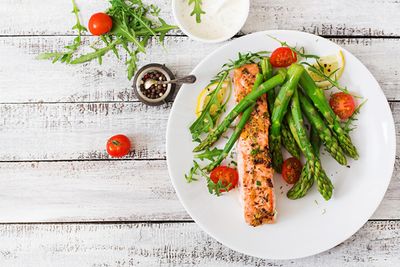The Whole30 diet is all the rage, claiming to have 100,000 satisfied customers since April 2009. But is all the fuss justifiable?
This 30-day regimen eliminates all grains, dairy, sugar and legumes. That translates into a lot of restrictions—as in sandwiches, milk, yogurt, pizza, peanut butter, cereal, cheese and many more "forbidden foods." And if all the restrictions make you want to reach for a glass of wine, don't: alcohol is also a big no-no.
The reason to adopt this diet, claim the diet's founders, is that "certain food groups ... could be having a negative impact on your health and fitness without you even realizing it."
They say that eliminating these specific foods from your diet for 30 days—unhealthy foods that cause inflammation, a sluggish metabolism and hormonal imbalances—will give your body a chance to heal from things like low energy levels, poor sleep, vague aches and pains, skin issues, allergies, fertility problems and digestive ailments. In other words, just about any health issues a large population of people are likely to suffer at any one time.
What's allowed? The diet encourages you to eat meat, seafood, eggs, vegetables, some fruit, oils, nuts and seeds, and foods that have very few ingredients. So far, so good. With its emphasis on healthy proteins, vegetables and unprocessed foods, the diet sounds promising.
But what it doesn't allow are lots of foods, like anything with added real or artificial sugar (that means no maple syrup, honey, agave nectar, coconut sugar and sweeteners like Splenda, Equal, stevia, etc.); any grains (including quinoa); any legumes (like beans, peas, lentils and peanuts); all forms of soy (including soy sauce, miso, tofu, tempeh, edamame); and all dairy (including cow, goat or sheep's milk products, kefir, yogurt and sour cream).
And if you find yourself anywhere near a scale, you'll have to refrain from the temptation to peek. You'll have to wonder if you're losing weight until the 30 days are up. Same goes for taking any measurements or analyzing your body fat percentage. The diet discourages you from counting calories and focusing on your weight and, instead, encourages you to make yourself healthy and "change the way you eat forever."
At the end of the diet, you slowly reintroduce the foods you've ignored for a month to figure out which are the culprits causing your health issues. According to testimonials on the Whole30 website, people have claimed to find relief from things like ADHD, fibromyalgia and diabetes.
So, does it work?
In some respects, yes. "If you are looking to lose weight, you certainly will … for as long as you can stay on such a restrictive diet," says Caroline Apovian, MD, and vice president of The Obesity Society and professor of medicine at Boston University. After all, any time you eliminate foods—especially those not-so-healthy-foods that are processed or contain added sugars—chances are good that you'll lose some weight. And alcohol adds up in the calorie department, too, so by banishing that from your diet (assuming you do drink), you're slashing lots more calories.
But short of that, Apovian points out that the diet excludes a lot of "good" foods that are essential to a wholesome diet. "How can you eliminate grains and legumes, which have so much fiber and nutrients and are so healthy for you?"
She sees the diet as a Paleo spinoff: "Just because we ate that way once doesn't justify that we eat that way today. Our digestive tracts have developed since then to be able to utilize grains and legumes. A long time ago we never had many cancers—because we did not live long enough—but we now need protection from GI cancers with FIBER!"
Dairy is an important source of calcium and Vitamin D and protein. And legumes, aside from being high in fiber, are also inexpensive, low in fat, and excellent sources of plant-based protein.
Chief among the diet's drawbacks, Aprovian says, are the lack of nutrition credentials among the diet's creators. She suggests that the only people who might consider this diet "are those who can't tolerate dairy or gluten or who are lactose intolerant."


